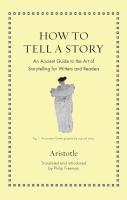
Princeton (2022) h/b 244pp £12.99 (ISBN 9780691205274)
This volume is part of the Princeton series ‘Ancient Wisdom for Modern Readers’. It may not be immediately obvious from the title, but this is a new translation of Aristotle’s Poetics, a notoriously complex text. It is presented in the manner of a Loeb, with Greek and English on facing pages. F. has written a brief introduction, including summaries of Aristotle’s life and works, with a synopsis of the Poetics, and a note about the difficulties presented by the text, which has survived in an incomplete and somewhat muddled form. It is accompanied by useful footnotes and a brief list of further reading. F. has also added his own chapter headings, numbering and bullet points to help the reader.
This is certainly a very clear and readable translation, which enables those with or without knowledge of ancient Greek to engage with Aristotle’s ideas and appreciate his arguments. These include his widely quoted definition of the salient ingredients of a tragedy. F. opts for the standard translation of these, for example, but helpfully glossed, e.g.: ‘Tragedy evokes pity and fear, by doing so it brings about a catharsis or purging of emotions.’ The Poetics also includes Aristotle’s views on epic and comedy and comparisons between the different genres. Other sections deal specifically with the essential structure of tragedy and use of language, focusing in detail on different types of nouns and verbs and elements of style, as well as on the importance of plot and the craft of storytelling. For those who have a little Greek or a somewhat lapsed acquaintance with the language, the perhaps inevitable disjunction between the Greek text and its facing, more prolix, English translation may present challenges. However, F.’s insertion of section numbers alleviates this issue.
The endleaf of the dust jacket waxes lyrical about the Poetics, stating that it ‘remains essential reading for anyone who wants to learn how to write a captivating story—or understand how such stories work and achieve their psychological effects.’ In his introduction F. calls the Poetics ‘a living guidebook for modern authors’ and quotes Aaron Sorkin, the Academy Award winning screenwriter in support: ‘Rules are what makes art beautiful… These rules also apply to writing. The rulebook is the Poetics by Aristotle. All the rules are there.’ Some might argue that we now live in an age where many have little regard for ‘rules’ and that writers often strive to be innovative and to forge their own personal style. Aristotle is dealing mostly with a very specific genre, Greek tragedy, which has no real equivalent today. Moreover, he is often dogmatic, and his assertions about what makes a good tragedy or how epic, tragedy, comedy and history must differ, leave little room for a writer’s innovation or originality. This might not appeal to every aspiring writer today.
Nevertheless, F. has certainly provided us with a clear and comprehensive version of one of Aristotle’s most obscure texts, presenting it in an accessible format and providing a fluent and easy to read English translation. Whether or not you are an aspiring author, this is certainly worth studying.
Marion Gibbs
